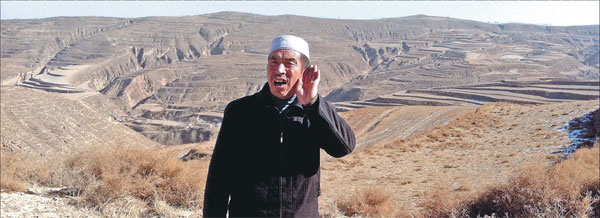When melody blooms
Updated: 2013-02-01 10:42
By Mu Qian (China Daily)
|
||||||||
 |
|
Ma Chengfu, a farmer in Guyuan, in south Ningxia, volunteers to teach students to sing hua'er, which he says is a tradition that every Hui person must cherish. Mu Qian / China Daily |
Locals in Northwest China sing hua'er, a type of traditional folk song, anytime and whenever they feel happy or sad. Mu Qian speaks to some hua'er enthusiasts on its appeal.
|
 |
|
 |
|
 |
About 10 years ago, rock musician Su Yang was inspired by a CD of blues to begin making his own music. One of his first works, however, was an adaptation of hua'er, a kind of traditional folk song from Northwest China.
"If Western musicians can turn blues to pop and rock, we can use hua'er to create contemporary Chinese music," says Su, who is from Yinchuan, capital of Ningxia Hui autonomous region. "Hua'er is a very unique and down-to-earth kind of song that has its distinct melodic patterns, structures and rhetoric systems."
In his second album, released in 2010, Su covered a traditional hua'er titled The Night Journey (Xia Ye Chuan), which tells a man's secret rendezvous with his lover.
The song begins with depictions of the scenery from the mountain to the plain, which was later disclosed to be underlining the difficulty of the meeting.
Hua'er, which literally means flower, is said to have got its name from the image of a flower symbolizing one's beloved woman.
For local people, hua'er is an important vehicle for expressing personal feelings and a popular rural entertainment.
Many hua'er songs begin with metaphoric and symbolic depictions of scenery, before developing into the real theme, which may be young love, the hard work and weariness of the farming life, and the foibles of men and women.
Su learned The Night Journey from Wang Dexian, a 73-year-old farmer who lives in Helan county near Yinchuan.
"Hua'er is very contagious, and contains folklore and the emotions of Northwestern Chinese people," Wang says. "It is like a treasure house."
Wang began to sing hua'er in childhood, when he tended the sheep grazing in the mountains. He learned it from elder shepherds who often sang hua'er to whip away loneliness or flirt with girls.
Hua'er is also called yequ or "wild tune", since it is often sung in the wild. It is actually forbidden to sing hua'er within the family or in the village in most areas, because of its erotic content.
For outsiders, hua'er is hard to understand because of the high-pitched singing, local accent and the use of many empty words.
The music is drawn from an extensive traditional repertoire named after ethnicities, towns or flowers ("Tu People's tune", "White Peony tune"), and lyrics are improvised in keeping with certain rules - for example, verses have three, four, five or six lines, each made up of a certain number of syllables.

 'Taken 2' grabs movie box office crown
'Taken 2' grabs movie box office crown
 Rihanna's 'Diamonds' tops UK pop chart
Rihanna's 'Diamonds' tops UK pop chart
 Fans get look at vintage Rolling Stones
Fans get look at vintage Rolling Stones
 Celebrities attend Power of Women event
Celebrities attend Power of Women event
 Ang Lee breaks 'every rule' to make unlikely new Life of Pi film
Ang Lee breaks 'every rule' to make unlikely new Life of Pi film
 Rihanna almost thrown out of nightclub
Rihanna almost thrown out of nightclub
 'Dark Knight' wins weekend box office
'Dark Knight' wins weekend box office
 'Total Recall' stars gather in Beverly Hills
'Total Recall' stars gather in Beverly Hills
Most Viewed
Editor's Picks

|

|

|

|

|

|
Today's Top News
Boston bombing suspect reported cornered on boat
7.0-magnitude quake hits Sichuan
Cross-talk artist helps to spread the word
'Green' awareness levels drop in Beijing
Palace Museum spruces up
First couple on Time's list of most influential
H7N9 flu transmission studied
Trading channels 'need to broaden'
US Weekly

|

|







